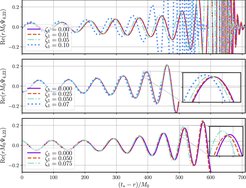Dr. Maxence Corman
Postdoctoral researcher in the “Astrophysical and Cosmological Relativity” department

What is your current position at our institute?
I'm a postdoctoral researcher in the Astrophysical and Cosmological Relativity department.
What is your academic education?
- Perimeter Institute for Theoretical Physics, 2019 - 2023, Doctoral studies (Ph.D.)
- University of Glasgow (UoG), 2016 - 2019, Master in Science (M.Sci.), Joint honours in Physics and Astronomy
- University of Glasgow (UoG), 2014 - 2016, Bachelor of Science (B.Sc.), Physics with Astrophysics
What were your previous academic positions?
This is my first postdoctoral position.
How and when did you choose to do physics?
I always liked numbers and science but I decided to do Astrophysics in my last year of high school.
Did you have someone who acted as a role model or mentor to you in the past, or does so in the present? What is the most important thing you learned from them?
My Physics teacher in high school studied astrophysics and inspired me to do the same. I don't think I had or have one role model per se. There are many people I look out to in the field because they are so enthusiastic and driven by science. I think the most important thing I learned would be to just be yourself.
What would you recommend to a young woman wanting to start a career in physics?
Go for it :-) You can always do something else later on if it doesn't work out. Also don't pretend to be someone you're not.
What is your vision for women and girls in science in 20 years?
I want to believe that there will be gender parity in academic positions at all level: bachelor all the way to permanent positions.
What measures that target women and girls in science would you care about and/or would you like to see realized in the scientific community?
Right now I think there are starting to be fellowships that target women specifically as well as some places that apply quotas which is certainly very good but I would like to see a change in people's mindset in the sense that I believe there are still a lot of people in the field that subconsciously believe women are not as qualified as men.
Please describe your research in language understandable to scientists from other fields.
The ultimate goal of my research is to discover new physics in the strong-gravity regime. My focus lies in the study of extreme regimes encountered in cosmology, high energy physics and spacetimes surrounding compact objects, all of which are particularly promising yet complementary targets to probe for deviations of general relativity.
Do you have a favourite figure (from a paper you (co)authored?

With collaborators, I performed a detailed study of binary black hole mergers in a specific theory introducing deviations from general relativity . Different variants of this particular theory give rise to black hole solutions with scalar charge, the merger of which produces gravitational signals that differ qualitatively from GR, while still passing weak field tests. We quantified the impact of modifications of GR on the dephasing of the gravitational signal as compared to GR, the latter being a promising feature to be compared with current GW observations. The figure shows the gravitational wave signal for various systems and couplings of this theory.
Please let us know why you chose the Max Planck Institute for Gravitational Physics for your research.
Because of its expertise and breadth in gravitational physics.
Learn more about Dr. Corman’s research at www.sites.google.com/view/maxencecorman.

